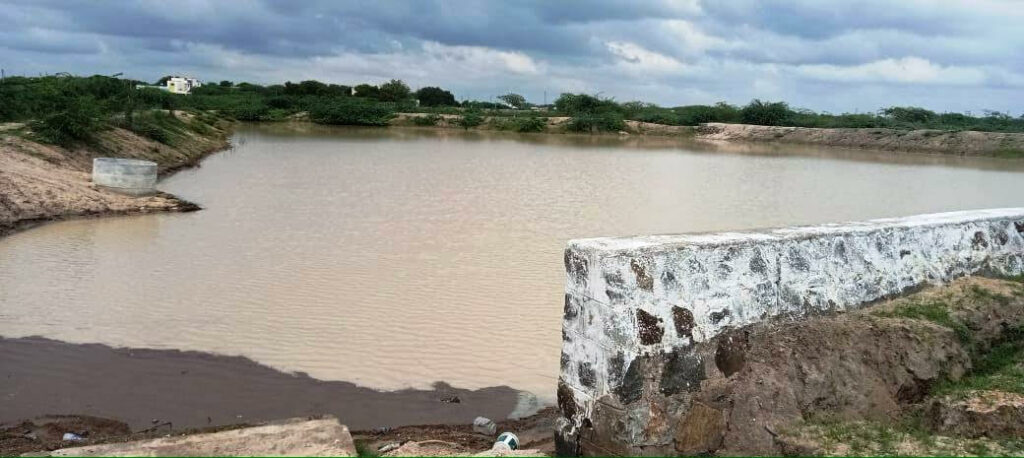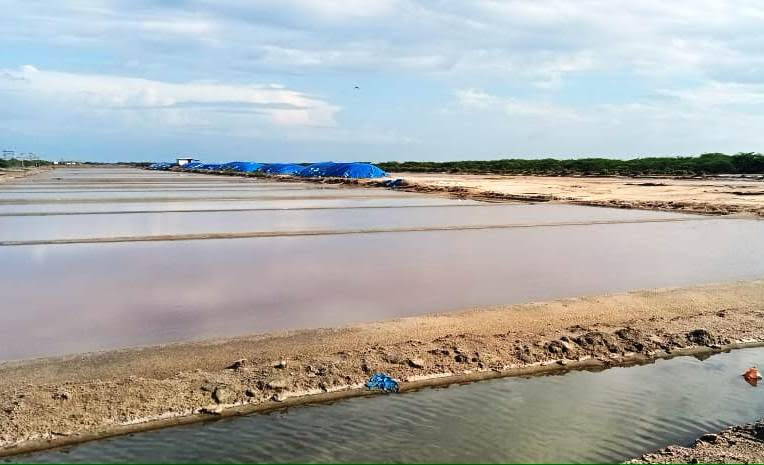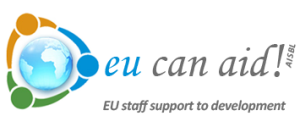
About the program
eu can aid and its partners Stichting Castricum Helpt Muttathara , the Netherlands, Education World 86, France, and VZW SOS Zoutmijnkinderen-India, Belgium, have decided to support an integrated five-years project in the saltpan area of South Tamil Nadu (India).
A total budget of 25,000 euros was allocated per year for the period 2020-2022, which was then extended until the end of 2024 due to encouraging results. Six villages have been selected in order to concentrate the funding on a well targeted population, with the hope this will ensure a sustainable impact. The project is implemented by a large Indian NGO “Social Change And Development” (SCAD NIRMAN) which has been active since 1985 in nearly 600 villages of the area.
eu can aid and its partners believe that a long-term commitment can make a real difference for the local population and that different needs have to be addressed in an integrated way to make
development sustainable.
To join us in supporting this program and to follow its realisation click the button below!
Why do we need to support a project in this area?
The proposed project villages are located in and around Tuticorin, a port town situated in the Gulf of Mannar about 125 km north of Cape Commorin, the Southern tip of the Indian peninsula. This area
is generally very dry and receives only limited rainfall during the northeast monsoon season (October–December). This makes the land unsuitable for agriculture and it is used in the dry months for the production of salt by evaporation of sea water in basins called “saltpans”. Many of the villages in the area do not have access to fresh water due to salt contamination in local water table.
Living and working conditions are poor: bad housing, lack of safe drinking water and toilet facility, dust roads, and very low wages (2 to 5 euros per day). These are not paid in the four rainy months since no production is possible, and workers have to look for agricultural work in neighbouring areas. Workers (including many women but no longer children) and their families suffer from the saline environment in which they live and work. They are prone to occupational illnesses such as blindness caused by the reflected glare of the sun off the salt crystals, skin problems and high blood pressure. Life expectancy is low, infant mortality is high, malnourishment is common among children and women, whilst alcoholism is frequent among men.
eu can aid and its partners believe that these needs can be addressed by an integrated development project focusing on sectors such as education, health & nutrition, income generation, women empowerment, water and sanitation, the ultimate aim being improving the quality of life of saltpan workers and their families.
Reporting on achievements
SCAD NIRMAN proposed an integrated intervention which would address key selected areas.
The governance of the project will be based on bottom-up consultation mechanisms to ensure that the interventions are well tailored to the needs. What has been done so far?
Village Development Committee (VDC). These committees are responsible for the overall project implementation and its sustainability at the village level it is necessary to motivate and train them at least twice in a year on village development programmes. Out of 72 members, 61 members attended and benefited from the trainings conducted during the project period. Developmental activities such as renovation of both preschools at Kalaignanapuram and Tuppaspatti villages and restoration of Ooranies (Village ponds) in the villages Thulukkankulam, Tuppaspatti and Kaloorani were meticulously planned and executed with the support of the VDC and villagers under the
leadership of SCAD NIRMAN.
Youth committees. Six youth committees were established comprising of 80 young people who readily volunteer for any developmental works pertaining to their villages. As planned two trainings were given to each youth committee where an average of 72 youths out of 80 participated every year to the trainings, including Team building, Importance of Planting Trees to improve green cover, Water management, Current affairs, Ooranie management, Career counseling and Employment schemes.
Women Self Help Groups (WSHG). A total number of 48 WSHG are active in the six project villages comprising of 646 women. The members of Self Help Groups play a vital role in execution of the developmental programs concerning their villages. SCAD Nirman provided two trainings each to the 48 Women Self Help Groups from the six project villages. An average of 553 members participated. Activities such as savings and credit linkages, Health and hygiene, Incomer generation initiatives, Ooranie restoration at 2 Thulukkankulam, Tuppaspatti and Kaloorani and renovation of Balwadies at Kalaignanapuram and Tuppaspatti were dcarried out.
Renovation and improvement of existing kindergartens and schools, supplementary education after school for 6-18 years old and career guidance for older children. What has been done so far?
Supplementary education center. As rural children are deprived of individual attention in their schools which lack of basic infrastructures and teachers, SCAD Nirman appointed one volunteer in each village to meet the educational needs of the children. A total of 226 children are eligible to be part of the centre and an average of 174 children is regular in utilizing this opportunity. To make the learning more interesting, SCAD Nirman established an environmental team that is responsible for organizing a school garden in each supplementary centre. To address the overall development of the students at the centre, education materials and sports materials were provided to each supplementary centre so that the students develop not only in studies but also in extracurricular activities and sports.
Upgrading Baldawies (pre-schools). SCAD NIRMAN wanted to equip the preschool to be conducive for early education. Quality Teaching and Learning materials including Television, were provided to the six Balwadies. 126 Children were very happy to see their Balwadies equipped with learning materials.
Career counselling programme. Though students from project villages study well, they lack guidance in choosing their stream towards pursuing higher education. Students who expressed their
willingness to pursue higher education were given career counseling by educational professionals from Engineering, polytechnic and teacher training colleges. 129 students took part in the three career counseling programme conducted. As a result 43 of them are already pursuing their higher education in the field of Arts and Science, Engineering, Physical education and Nursing.
Renovation of Balwadies. 2 Baldawies were nevovated and a total number of 55 students benefited from this. Both Balwadies were given a face lift and made conducive for the children to learn their early education with safety and creativity. The buildings were equipped with teaching and learning materials, including digital.
Several strands of activity will aim at improving health, such as training for village nurses and creation of a health clinic. What has been done so far?
Training of Health Committee Members. A total number of 30 members including members from WSHGs, Village Health Nurse and Balwadies teachers from the six villages were trained twice in a year by medical professionals on the basis of the medical needs of the villages.
Health infrastructure. Health Clinic was set up in Rajapandinagar and now caters to the needs of minor ailments like fever, cold, back pain, neck pain, foot ulcer etc and 1382 people. Recognizing special health needs, it was decided to conduct three special health camps in each village in every
quarter. The camps included: general, eye, ortho, dental, covid 19, gynecology and cancer. They benefited 1012 people in total.
Health Awareness Campaigns. They were conducted in the 6 villages, two times in a year with the support of trained health personnel. These focused on safe drinking water, communicable diseases, antenatal and post-natal care, preventive and curative health care, hygiene, importance of traditional food etc. 36 health awareness campaigns were conducted in the 6 villages which
benefited 1187 people.
Provision of Safety. Items that the people are most in need were handed out to 1163 people. Each year, a certain number of saltpan workers are given safety items like eye glasses, head loaders and boots.
Nutrition Awareness. The aim was to sensitize the community about the need for consuming nutritional food and equipping them to prepare nutritional food with locally available ingredients. The health of adolescent girls, pregnant mothers and lactating mothers is crucial, and SCAD Nirman organized 36 nutrition awareness training and demonstration covering each village, which were attended by 414 people. Distribution of Nutrimix Distribution of Supplementary nutrition was done to 30 pregnant mothers and 30 lactating mothers to boost their immunity and body weight. This contributed to ensure 96 safe births. There has been no incidence of cesarean among 96 babies born in the three years of the project. Villagers were encouraged to cook traditional nutritious recipes and the best recipes were awarded with prizes.
This will be supported through the provision of business training and a micro-credit facility. 71 candidates were shortlisted for the rigorous training into employability skills so that they become
self efficient in starting their journey as entrepreneurs. Candidates were trained into the trades of Tailoring (24), Beautician (15), Electrician (8), Driving(6), Sales and Marketing (6), Fishnet making (10) and Two Wheeler mechanism (2). It is to be noted that candidates who underwent two wheeler mechanism, fishnet making, beautician course, and tailoring are already on the road to sustainability.
Start and Improve Your Business (SIYB) course. In three years, this course was given to 134 women working in Saltpans. It provided them with the capacity to start small businesses during the off season when the rain prevents them from harvesting salt and confine them in their houses. So far, 34 income generation businesses were established in three years.
Water scarcity is a very crucial issue in the villages, which affects especially women. Due to inadequate maintenance, the traditional water bodies in the villages are not able hold enough water when it rains and get totally dried up during summer. Traditional water bodies from the villages of Thulukkankulam, Tuppaspatti and Kaloorani were restored by de-silting, strengthening of bunds, creating of baby ponds, clearing the inlet channels and planting of trees around the bunds. A total number of 1564 people are the direct beneficiaries while 1093 are the indirect beneficiaries.
- All
- Gallery Item






